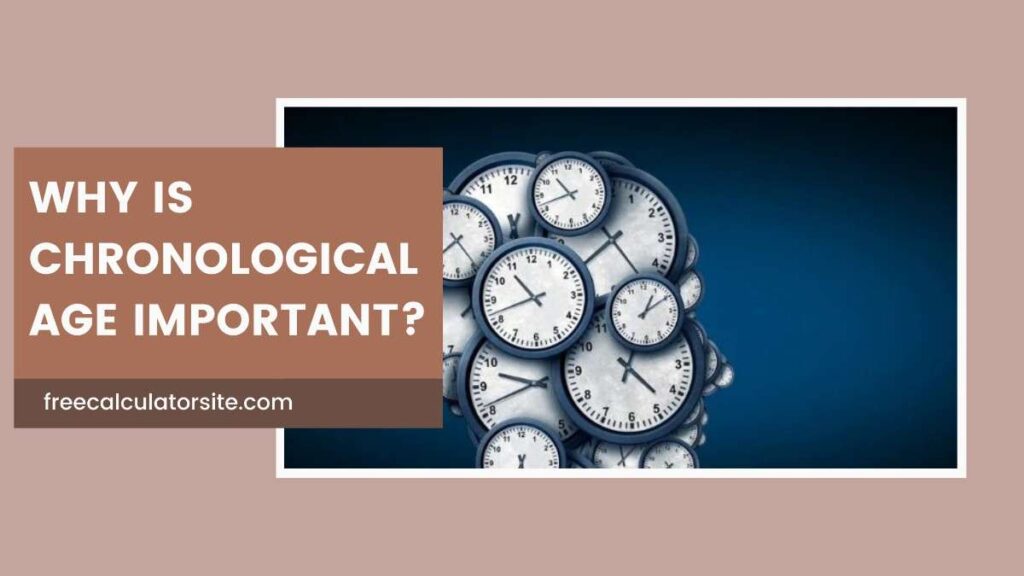Last updated on October 24th, 2024 at 09:35 pm

Chronological age is a concept most of us take for granted.
It’s the simplest way to express how long someone has been alive, calculated from the date of birth to the present.
While it seems straightforward, the importance of chronological age reaches far beyond just marking another birthday.
It influences a wide range of life events, legal statuses, and developmental stages.
In this article, we’ll explore why chronological age is important and how it impacts individuals and societies in profound ways.
1. Legal and Social Benchmarks
One of the most significant roles chronological age plays is in determining legal rights and responsibilities.
Throughout different stages of life, societies use age to set boundaries for legal activities.
For example:
- Voting and Civic Rights: Most countries allow people to vote when they turn 18. This age is seen as a marker of adulthood and the capacity to make informed decisions about governance.
- Driving: At a certain age (often 16 to 18, depending on the country), individuals are legally permitted to drive, symbolizing a transition into greater independence and responsibility.
- Alcohol and Tobacco: Chronological age is used to control when people can legally consume alcohol or tobacco. This is based on societal views regarding maturity and health risks at different ages.
- Senior Benefits: At the other end of the spectrum, chronological age determines eligibility for pensions, retirement benefits, and healthcare assistance for the elderly.
These legal benchmarks are designed to protect individuals and society by acknowledging the different stages of physical, mental, and emotional development tied to age.
2. Developmental Milestones
From a psychological and educational standpoint, chronological age helps measure development.
Children grow and develop at different rates, but chronological age provides a rough guide for when certain milestones should be reached.
Schools often rely on chronological age to group children, assuming that those of the same age will have similar developmental levels.
- Cognitive Development: Psychologists like Jean Piaget have identified stages of cognitive development that typically correspond with specific age ranges. For instance, the “concrete operational stage,” where logical thinking begins, generally occurs between the ages of 7 and 11.
- Emotional and Social Growth: As children age, their ability to interact with others and manage emotions develops. By tracking chronological age, parents and educators can better understand when children should be ready to handle certain emotional challenges or social interactions.
While not every child develops at exactly the same pace, chronological age serves as a helpful yardstick for assessing whether a child is meeting typical developmental expectations.
3. Health and Medical Relevance
Chronological age is a crucial factor in the healthcare field.
Medical professionals often rely on it to determine appropriate treatments, screenings, and lifestyle recommendations.
- Pediatric Care: In pediatrics, chronological age is essential for monitoring growth, diagnosing conditions, and setting vaccination schedules. For example, newborns and infants have specific medical needs tied to their age that wouldn’t apply to older children or adults.
- Adult Health: As adults age, their risk for certain conditions increases. Medical guidelines for screenings—such as mammograms, colonoscopies, and bone density tests—are often based on chronological age. Knowing a patient’s age helps doctors anticipate health risks, offer preventative care, and tailor treatment plans.
- Elderly Care: For older adults, chronological age plays a central role in determining care. While some people age biologically better than others, knowing a person’s chronological age helps caregivers and medical professionals assess vulnerabilities related to physical frailty, cognitive decline, and chronic disease.
See Also: What is Functional Age?
4. Social Roles and Expectations
Chronological age shapes societal expectations about what roles individuals should play at various life stages.
Societies often define periods of life by chronological age, such as childhood, adolescence, adulthood, and old age, with each stage carrying its own expectations and responsibilities.
- Youth and Adolescence: In many cultures, adolescence is a time of learning, exploration, and preparation for adult life. Teens are expected to attend school, develop life skills, and gradually take on more responsibility as they transition toward adulthood.
- Midlife: In adulthood, individuals are typically expected to establish careers, raise families, and contribute to society. Chronological age influences decisions around life transitions like buying a house, settling down, or retiring.
- Retirement and Aging: Aging brings a shift in societal roles. Many individuals, upon reaching a certain age, step back from their careers and take on different roles, such as mentoring younger generations, traveling, or focusing on hobbies and leisure.
While these expectations vary across cultures and individuals, chronological age provides a framework for understanding how life roles evolve.
5. Age and Identity
Chronological age also contributes to personal identity. Many people associate certain feelings, accomplishments, or goals with specific ages.
It’s common to hear someone say, “By the time I’m 30, I want to have a stable career,” or, “I hope to retire by 65.”
In this way, age acts as a milestone marker for personal achievements.
Moreover, how people perceive their age can influence their self-esteem and social interactions.
In youth-oriented cultures, being younger may be seen as more desirable, leading to the pursuit of activities, fashions, or even medical procedures that maintain a youthful appearance.
On the other hand, age can also be a source of pride.
Older individuals may associate wisdom, life experience, and resilience with their age.
In certain societies, the elderly are revered for their age and seen as valuable sources of knowledge and guidance.
6. Age and Employment
In the workforce, chronological age can significantly impact career opportunities and progression.
Age often plays a role in hiring, promotions, and retirement decisions.
- Entry into the Workforce: In many countries, there are minimum age requirements for employment to ensure that children are protected and allowed to focus on their education and development.
- Retirement Age: Most companies have policies that guide when employees are eligible for retirement benefits, typically around 60 to 65 years of age. In some cases, retirement is mandatory, based on age.
However, it’s worth noting that chronological age in the workplace has sparked debate regarding age discrimination.
Some argue that decisions around employment should be based on skill and performance, not on how old someone is.
Also Read: What Are the Differences Between Chronological and Biological Age?
7. Chronological Age and Life Insurance
Life insurance policies often hinge on chronological age.
Younger individuals typically enjoy lower premiums, as they are seen as lower risk for insurance companies.
Conversely, older individuals may face higher premiums or difficulty securing coverage.
This highlights another practical way that age influences financial decision-making and personal planning.
Conclusion
While chronological age may seem like a basic number, it plays a critical role in shaping our lives.
It dictates legal rights, determines developmental milestones, influences healthcare, and forms the foundation for social and personal identities.
Age structures our world in ways we often overlook, making it an essential marker for navigating life’s stages.
Understanding the importance of chronological age helps us appreciate its broad impact on individuals and society alike.

Sayantika Karmakar provides expert insights on financial calculators in her blog posts.
